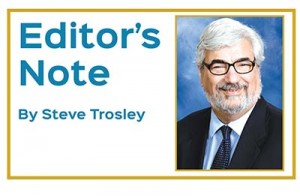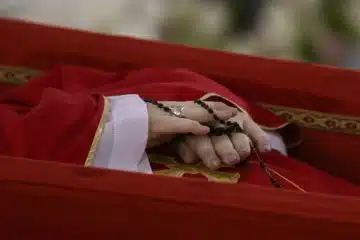We are people working for salvation
 Labor Day has just passed and as the nation celebrated the end of summer and the joys and glory of working, a cherished memory came.
Labor Day has just passed and as the nation celebrated the end of summer and the joys and glory of working, a cherished memory came.
Dad went to a car dealership in 1959 and came home with a 1957 red Lincoln Premier two-door coupe. It displayed all of the excesses of 1950s automotive design – gigantic fins, an engine that would be rated today at six liters, electric windows and a radio that scanned the AM dial by pressing a button. It weighed almost 4,500 pounds. It went real fast between gas stations.
After the austere, black four-door 1954 Chrysler New Yorker sedan we had watched turn into a wheezing, smoking pile of flaking iron oxide, it broadcast that Dad had gotten a raise at work or someone in the family had died and left him soldi, (Sicilian for the word money.)
A lover of deals, he was clearly pleased with himself but Mom had a different reaction: “It’s not for us. We’re working people.” Dad and Mom were both children of immigrants and they took Genesis 3: 19 seriously: “By the sweat of your brow, you will eat your food, until you return to the ground…”
Both grandfathers had been laborers and had retired as employees of the Standard Oil Company’s local refinery, one as a track repair gang leader and the other as a coke still cleaner. Maternal grandfather Antonino always clocked in exactly one minute before starting time and one minute after the end-of-shift whistle blew. “I give the company two minutes, so I don’t owe the boss anything,” he’d say.
Mom was always ready to put on the gloves and although they thought their children did not hear the argument – the kids always hear those things, friends – a tense holiday weekend followed. But the car endowed a certain status and as flattering compliments came her way, especially when we showed up to Sunday Mass in that land yacht, she started to break down. Then when her sister’s family came to dinner in an aging DeSoto – the sisters were competitive – the deal was done.
Dad kept that monster running until 1964, when a new union contract and a promotion in the refinery’s analytical lab meant he could trade it for a new Buick. But that phrase: “It’s not for us, we’re working people,” replayed often through the years.
It was a badge of pride and a bias. To say we were “working people” declared to the world we had earned what we had, didn’t need whatever we did not have and owed no one anything. It tempered the resentment of our friends and neighbors who were, in some way, better off and masked the covetousness of which we were certainly guilty. They might have a newer car or a fancier house, but we had the pride in knowing we were self-sufficient.
The folks were not scriptural scholars, but Proverbs 16:18 was a way of life: “Pride goeth before destruction, and a haughty spirit before a fall. Better it is to be of a humble spirit with the lowly, than to divide the spoil with the proud.” And to hear my folks, we were darned proud of being lowly.
At some point in history, work conferred status rather than being a Biblical punishment for original sin.
We learned in Catholic school that St. Joseph, my father’s and mother’s namesake, was a hard-working carpenter who taught Jesus the trade. Jesus was focused on doing the work of salvation as we can see thought out the four Gospels.
When I was out of work briefly after I graduated from college – draft status and a recession – it was a major family crisis. We were working people. We did not collect unemployment or accept charity. We always found some work someplace, even if it was loading boxcars with a college degree – which I did.
So, here’s a salute to all who labor in an honorable occupation and a reminder that the work of salvation is assigned to all of us, regardless of how we earn our living.













